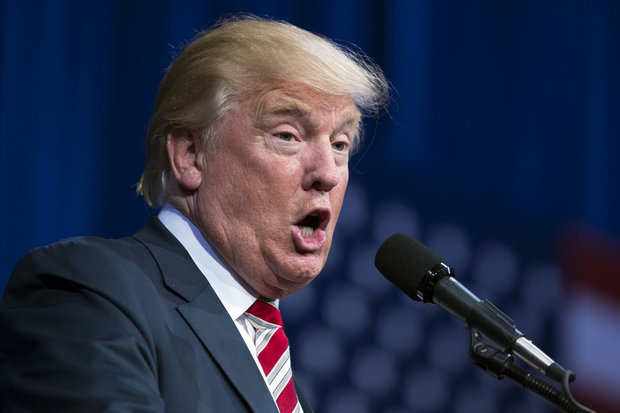

PITTSBURGH (AP) — Stepping deeper into America’s race debate, Donald Trump on Thursday warned African-American protesters that their outrage was creating suffering in their own community, as he worked to walk a line between his law-and-order toughness and new minority outreach.
“The rioting in our streets is a threat to all peaceful citizens and it must be ended and ended now,” Trump, the Republican nominee for president, declared at a rally in suburban Philadelphia on Thursday night.
“The main victims of these violent demonstrations,” he added, “are law-abiding African-Americans who live in these communities and only want to raise their children in safety and peace.”
The comments came hours after a white Oklahoma police officer was charged with manslaughter Thursday in the fatal shooting of an unarmed black man whose vehicle had broken down in the middle of the street. That and another police shooting of a black man in North Carolina have sparked fierce protests that continued to simmer Thursday night.
Trump, eager to blunt criticism that his campaign inspires racism in the midst of what he called “a national crisis,” has sought to express empathy in recent days. But his words could rankle some in the African-American community, underscoring the challenges he faces.
Earlier in the day, Trump seemed to suggest that protesters outraged by the police shootings of black men were under the influence of drugs.
“I will stop the drugs from flowing into our country and poisoning our youth and many other people,” Trump declared at an energy conference in Pittsburgh. He added, “And if you’re not aware, drugs are a very, very big factor in what you’re watching on television at night.”
Trump’s campaign rejected the interpretation that he was talking about the protests seen on cable news the last few nights.
“It is clear what he said, and what he meant. It’s obvious that he was referring to the recent increase in drug-related deaths and subsequent news reports, thus making it a hot-button issue,” said campaign rapid response director Steven Cheung.
Trump also raised eyebrows Wednesday when he seemed to call for the national expansion of “stop-and-frisk,” a police tactic that has been condemned as racial profiling. On Thursday, Trump clarified that he had been referring only to murder-plagued Chicago.
Democrat Hillary Clinton did not address escalating racial tensions Thursday as she prepared for her first debate-stage meeting with Trump. She dinged her opponent, albeit in a humorous way, in an interview released Thursday on comic Zach Galifianakis’ web program, “Between Two Ferns.”
The comedian asked her what Trump might wear to Monday’s debate.
“I assume he’ll wear that red power tie,” Clinton said. Galifianakis responded, “Or maybe like a white power tie.”
“That’s even more appropriate,” Clinton said.
At his evening rally, Trump hit back, accusing Clinton of supporting — “with a nod” — “the narrative of cops as a racist force in our society.”
“Those peddling the narrative … share directly in the responsibility for the unrest that is afflicting our country and hurting those who have really the very least,” he said.
Both candidates are working to navigate the politics of race with Election Day less than seven weeks away and early voting about to begin in some states.
Trump, in particular, has struggled to balance a message that appeals to his white, working-class base with one that improves his standing with minorities and educated whites who may worry about racial undertones in his candidacy. He was slow to disavow former KKK leader David Duke earlier in the year and has repeatedly promoted tweets by white supremacists during his White House bid. The Republican nominee admitted for the first time publicly last week that President Barack Obama was born in the United States.
On Thursday, Trump tried at times to project a softer message, calling for a nation united in “the spirit of togetherness.”
“The job of a leader is to stand in someone else’s shoes and see things from their perspective. You have to be able to do that,” he said.
At the same time, Mahoning County, Ohio, chair Kathy Miller, a campaign volunteer, came under fire after telling the Guardian newspaper, “I don’t think there was any racism until Obama got elected.” The Trump campaign accepted her resignation after what a spokesman called “inappropriate” comments.
In North Carolina, Republican Rep. Robert Pittenger, whose district includes parts of Charlotte where protests have turned violent, said they stemmed from protesters who “hate white people because white people are successful and they’re not.” Pittenger later apologized.
Clinton has made curbing gun violence and police brutality central to her candidacy. She said Wednesday that the shootings in Oklahoma and North Carolina added two more names “to a long list of African-Americans killed by police officers. It’s unbearable and it needs to become intolerable.”

Be the first to comment